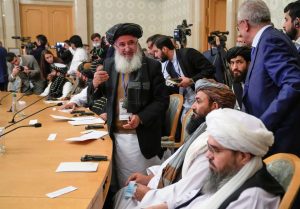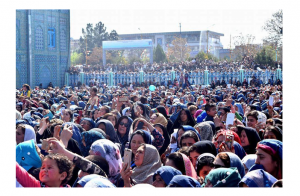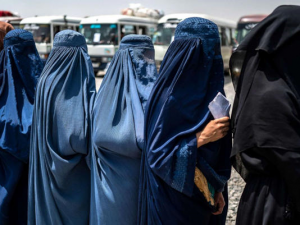The fast and brutal collapse of the Islamic Republic of Afghanistan on August 15, 2021, shocked the world and the war-wary public of Afghanistan, who had lost hope for peace under the onslaught of Taliban’s violence and the misguided rule and corruption of Ghani’s administration. The fall of the Afghan Republic was not only the end of a political system, but it was also a drastic change in the way of life for millions of Afghan citizens, particularly women and girls, who had become accustomed to the nascent liberties of an open society and tastes of a relatively liberal and growing economy. The two-decades-old republic, along with its travails and achievements of the “democratic” governance, succumbed to a fighting and despotic machinery, who has learned how to hide its true intentions and manipulate the world public opinion by making false promises and quickly reneging on them under the veil of Islamic rules and flawed tribal traditions.
Many factors caused the Afghan Republic to fall or to be forcefully toppled. The immediate wrenching factor was the sudden flight of the President, who according to the Republic’s constitution was the head of state, chief executive, and commander-in-chief of the Afghan armed forces. Before escaping the country and allowing the Taliban to take over, Ghani and his minions did everything in their power to scuttle the peace negotiations that were going on in Doha since early 2020. These negotiations were supposed to make possible a peaceful transfer of power to a broad-based dispensation (including the Taliban, the sitting administration, and other Afghan politicians and stakeholders). This step, if implemented successfully, could have paved the way for the creation of a transitional administration that would have drafted a new constitution, while allowing the Taliban to become part of the political process and put their mark on the new constitution. This would have made it possible for Afghanistan to save and rescue some of the major achievements of the last 20 years that were made possible by the U.S.-NATO presence in the country.
While pseudo negotiations were going on in Doha, Ghani, and his small coterie of trusted but inexperienced advisors, made personnel changes in the army and took tactical actions that drastically weakened the fighting power and incentives of the Afghan national security forces. This opened the gate for the Taliban onslaught, which reached the gates of Kabul on August 14, 2021.
There are rumors that a few hours before Ghani’s escape on August 15, 2021, his National Security Advisor got in touch with Sarajudding Haqqani, the leader of the Haqqani Network, informing him that the President and his close advisors are leaving the country and the Taliban will be able to enter Kabul without expecting any resistance from the delipidated national army. In this way, Ghani abandoned the Afghan army and the people of Afghanistan subjecting them to a chaotic, dangerous, uncertain, and frightening situation. After Ghani’s escape, the Taliban entered Kabul without facing any opposition. Afghan military units, who felt abandoned and betrayed, tried to save their own lives after the leadership vacuum was left behind by Ghani and many oligarchs who profited handsomely throughout Afghanistan’s long, violent war. The scenes at Kabul’s airport were heartbreaking: people being beaten or killed while trying to escape the Taliban rule.
In hindsight, the signing of February 29, 2020, agreement between the United States and the Taliban must have been perceived by the latter as an unexpected, God-sent gift. The author believes that this agreement equipped the Taliban with unprecedented prestige and fame legitimacy and military prowess. As a matter of fact, the most striking result of the Doha agreement was skyrocketing military morale among the Taliban leaders and its rank and file.
In contrast, the Doha agreement had a devastating and demoralizing impact on the Afghan armed forces, the ordinary Afghans, and those working at different levels of the republican government. All Afghans who had trusted America for twenty years suddenly came to believe that they were abandoned by the U.S. government, the principal supporter of Afghanistan in its fight against violence and disorder. It is noteworthy that Afghans are not alone in the depth of their frustration towards what happened in their country because of the hasty and premature decisions made in Washington, D.C. U.S. generals David Petraeus and Kenneth Franklin McKenzie Jr, as well as former Trump national security advisor John Bolton, have expressed similar sentiments. The American taxpayer spent many, many billions of dollars over twenty years to train and equip the Afghan security forces, underwriting state-building, and reconstruction, trying to educate the populace, and promote human rights. All these initiatives and achievements vanished within hours of time on August 15, 2021, and with them were dashed the dreams and aspirations of millions of Afghans who were looking for a better future for themselves and their children.
Despite the suddenness of the collapse, one should not forget that the seeds of the collapse were sown long before it happened. Lack of good governance, widespread corruption, fraudulent elections, lack of justice, nepotism, and the familiar syndrome of extreme state-financial dependency were among many factors that weakened the republic and led to its demise. According to Transparency International, Afghanistan was near the bottom of its Perception Index for 2020 with crippling effects on public trust in the government and its officials.
It should also be mentioned that the failure of the Republic was to a large extent the result of a lack of belief in democracy on the part of Afghan power holders. Most of these so-called leaders used democracy and elections as tools to enrich themselves and preserve their power. They marginalized their political rivals and engaged in continuing political wheeling and dealing. So, the country was governed in the name of democracy; in reality, it was run by people and political clubs who did not believe in or play by the rules of democracy. The misuse of state power and widespread practice of taking advantage of public office for personal enrichment led to a severe loss of trust in democracy and consequently to dwindling participation in elections. In the 2004 presidential election, three-quarters of registered voters participated in the election, but in the last presidential elections (2019) out of around 12 million eligible voters only 1.6 million showed up at the poll stations (less than 15%.)
Afghanistan did have the experience of democracy in the past. Those who drafted the constitution of 1964 during the monarchy believed in democracy and conducted themselves as true democrats. The governments that materialized during that era were acceptable to the people because they won votes of confidence from the parliaments which were elected in free and transparent elections. For one decade Afghanistan had a constitutional monarchy without any foreign support. The Islamic Republic had the support of the United States and 48 other nations for twenty years. Since it was run by people who did not understand or did not respect democracy, it collapsed overnight.
In conclusion, there are now forty million Afghan people under the rule of a regime that is openly opposed to democracy, rejects political power-sharing, does not believe in human rights, limits women’s access to education, and opposes female participation in public life of the country.
Yet, it seems that the West is exclusively focused on the fate of a few thousand Afghan collaborators. These people are important, but more important are the 40 million Afghans at risk living inside Afghanistan under a regime sheltering a coterie of known terrorist groups (Al Qaeda, TTP, ISIL-Khorasan, and others). This regime, the language of whom is war, prides itself on having a whole brigade of suicide bombers ready to strike against innocent men, women, and children of Afghanistan. Human decency requires that the world does not remain indifferent to the threats facing peace in Afghanistan.




